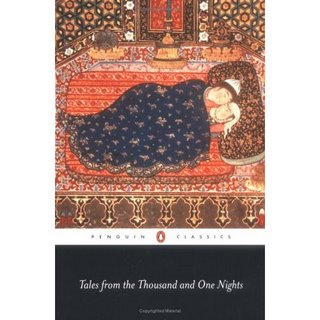6. 1001 Arabian Nights (first published c. 840)

Buy it
At Amazon UK
Review
Francsico: Firstly let me say that I haven't got the whole complete version of the Arabian Nights. Actually, there doesn't seem to exist one really, the closest is the 19th century Burton edition but he was a crap translator. You are better off with a good compilation of tales like the Penguin one, which is a nice 400 pages long instead of like 10 volumes.
These tales are the first book reviewed here which is pure entertainment. There is no serious moral to most of the tales and they are all the better for it. They are just plain entertaining. The whole book is set in its own universe of Arabian fantasy, where there seem to be as many Djinns around as people. And the whole magic fantasy thing really works in a universe which is as detailed as that of the Arabian Nights, which developed through centuries or even millenia of folk tales.
So, if you like the idea of magic lamps, Djinns and some deeply developed fantastic world this is something for you. Just remember that the book itself is nothing more than a compilation of many many tales from different areas of Arabic influence, and formulated in very different times. The idea of a framing story for it is also brilliant, and having Sherahzad telling these stories to the Sultan helps transport us to the fantasy world of the thing. I really loved it.
Vanda: This is another of the books I grew up with, although my version of the Arabian Nights, I recognise now, was considerably tamer. (It was for children, after all). It is still full of wonders now, though, at least to me.
These are beautiful, beautiful stories, and while the book is not short, it lets itself be read with ease, from story to story, and from story inside story inside story to next story. Metanarratives are again abundant, but not complicated, and they keep you interested in the book.
This is a very good collection that is easy to pick up, or to read a story from, and put it down again until it strikes your fancy. Also, if you have children, read them this book (well, maybe a slighter tamer version), because they'll love you for it.
Final Grade
Francisco: 8/10
Vanda: 8/10
Trivia
Will forever look at brass lamps in a new light!
From Wiki:
The nucleus of the stories is formed by a Pahlavi Sassanid Persian book called Hazār Afsānah ("Thousand Myths", in Persian: هزارافسانه). During the reign of the Abbasid Caliph Harun al-Rashid in the 8th century, Baghdad had become an important cosmopolitan city. Merchants from Persia, China, India, Africa, and Europe were all found in Baghdad. It was during this time that many of the stories, which were originally folk stories, are thought to have been collected orally over many years and later then compiled into a single book. The later compiler and translator into Arabic is reputedly storyteller Abu abd-Allah Muhammed el-Gahshigar in the 9th century. The frame story of Shahrzad seems to have been added in the 14th century. The first modern Arabic compilation, made out of Egyptian writings, was published in Cairo in 1835.
3 Comments:
At 7:54 PM, Anonymous said…
Anonymous said…
Hello, I come from Taiwan. I've just bought "1001 Books..." this week, and read it now. I try to find these books in google, then I find this blog! Just say hello and sorry for my poor English. =)
At 11:30 AM, Anonymous said…
Anonymous said…
Stating that Burton was a "crap translator" is an ill informed comment. What makes Burton's version of the Arabian Nights (which in fact are for the most Persian tales not Arab ones) so sought ater are his countless notes to the text - which greatly elucidate and add interest to the tales. Burton's notes alone on the ethnography and habits of the Near East are worth reading in and of itself. and his translation while jarring to a modern reader is a work of art initself. Read Borges essay on the tRanslation of the Arabian Nights in his "Selected Non Fiction."
At 2:32 PM, Francisco Silva said…
Francisco Silva said…
You might be mistaking this for a serious blog. It is of course a flippant statement, I admire Burton as much as the next bloke, it doesn't mean that he was a good translator, he was too concerned with keeping true to the text in order to produce a readable translation. You need a balance. He made tales which were in the vernacular for Arab readers a jarring experience for the English reader. He is keeping the form but not the intention of the texts. So he was a "crap" translator.
Post a Comment
<< Home